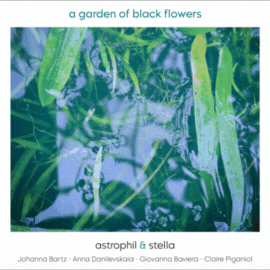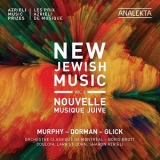 New Jewish Music, Vol. 2 (Azrieli Music Prizes); Kelly-Marie Murphy: En El Escuro Es Todo Uno; Anver Dorman: Violin Concerto No. 2 (Nigunim); Srul Irving Glick: Seven Tableaux From The Song Of Songs; Sharon Azrieli, Sopran, Lara St. John, Violine, Duo Couloir (Ariel Barnes, Cello, Heidi Krutzen, Harfe), Orchestre classique de Montréal, Boris Brott; 1 CD Analekta AN29262; Aufnahme 03/2019, Veröffentlichung 11/10/2019 (65') – Rezension von Remy Franck
New Jewish Music, Vol. 2 (Azrieli Music Prizes); Kelly-Marie Murphy: En El Escuro Es Todo Uno; Anver Dorman: Violin Concerto No. 2 (Nigunim); Srul Irving Glick: Seven Tableaux From The Song Of Songs; Sharon Azrieli, Sopran, Lara St. John, Violine, Duo Couloir (Ariel Barnes, Cello, Heidi Krutzen, Harfe), Orchestre classique de Montréal, Boris Brott; 1 CD Analekta AN29262; Aufnahme 03/2019, Veröffentlichung 11/10/2019 (65') – Rezension von Remy Franck
Die in Montreal beheimatete Azrieli Foundation hat 2014 einen Musikpreis in ihr Programm aufgenommen, um hochwertige neue Jüdische Musik zu fördern. Sie vergibt jährlich zwei Preise, von denen die des Jahres 2018 auf dieser CD zu hören sind, neben einem weiteren Werk des kanadischen Komponisten Srul Irving Glick (1934-2002).
Das erste Stück, En El Escuro Es Todo Uno (In the Darkness All Is One), stammt von Kelly-Marie Murphy. Sie hat in diesem Doppelkonzert für Cello und Harfe Elemente der Ladino-Folklore, also der jüdisch-spanischen oder sephardischen Folklore benutzt, die sie in ein eigenes Klanggebilde einbaut. Der erste Satz ist mysteriös und sehr atmosphärisch, der zweite sehr rhythmisch und spannungsvoll, brillant orchestriert und effektvoll gesteigert.
Der dritte Satz ist eine reflektive, gefühlvolle Kadenz für die beiden Soloinstrumente, während der Finalsatz diese Stimmungen aufnimmt und zunächst sehr ruhig ist, dann etwas dramatischer wird und schließlich ausgelassen tänzerisch endet. Die Interpreten haben die Musik gut im Griff und lassen sie mit vielen Farben und ausdrucksvollem Musizieren zu einem Erlebnis werden.
Das zweite Werk wurde von Avner Dorman komponiert, es ist sein Zweites Violinkonzert mit dem Titel Nigunim. Ein Nigun (Hebräisch für Melodie, Plural Nigunim) ist ein jüdischer religiöser Gesang, der meistens von Gruppen gesungen wird und oft keine Worte, sondern nur repetitive Klänge wie Bim-Bim-Bam oder Lai-Lai-Lai benutzt. Dorman hat das ins rein Instrumentale ‘übersetzt’.
Das Konzert ist eine Transkription von Dormans Dritter Violinsonate, die der Komponist für Orli and Gil Shaham schrieb. Ein Nigun dient, wie die Lubawitscher (Anhänger der orthodoxen Chabad‑Chassidim-Strömung) sagen, einer universellen Sprache, die über das Wort hinausgeht und eine tiefere spirituelle Botschaft vermittelt als Worte das je erreichen würden.
Für sein Stück studierte Dorman die jüdische Musik in verschiedenen Ländern und fand darin viele Gemeinsamkeiten: « Though I did not use any existing Jewish melodies for Nigunim, the main modes and melodic gestures of the piece are drawn from these common elements. Moreover, different sections of the piece draw upon local non-Jewish musical traditions of each of these regions: for example, the second movement uses principles found in Georgian folk rhythms and harmonies, and the fourth is inspired by Macedonian dances ».
Der erste Satz ist ein zunächst ruhiges Adagio religioso, das sich aber sehr eloquent steigert und Energie speichert, die im virtuosen Scherzo ausbricht. Dann folgt ein zweites Adagio, das wohl die angesprochene Spiritualität in ätherischen Klängen ausdrucken soll, ehe ein quirliges Presto ein Konzert beendet, das den Solisten zwar technisch beansprucht, ihm aber keine unbedingt sehr dankbare Aufgabe stellt, weil das Soloinstrument oft im Orchesterklang untergeht und das Ohr das reichhaltige Geschehen im Orchester auch gerne fokussiert, während die Geige weniger Beachtung findet.
Seven Tableaux From The Song Of Songs wurde 1992 von Srul Irving Glick komponiert und erklingt hier in einem Arrangement für Sopran, Klavier und Streichorchester von François Vallières. Die kunstvoll komponierten Lieder (O, let him kiss me; I am dark but lovely; King Solomon’s wedding procession; How beautiful you are my love; The little foxes; He took me to the wine garden; Set me as a sel upon your heart) sind voller Charme und Lieblichkeit. Sie verlangen eine leichte, junge Stimme, die Sharon Azrieli definitiv nicht hat. Aber die Sängerin ist nun einmal die Tochter des Architekten, Philanthropen und Holocaust-Überlebenden David Azrieli, und sie wird sich wohl aufgedrängt haben, trotz übermäßigem Vibrato, Intonationsproblemen und anderen Interpretationsdefiziten.
Die Lieder hätten eine bessere Interpretin verdient, von Dormans Konzert hatte ich mir mehr erwartet, so dass Kelly-Marie Murphys En El Escuro Es Todo Uno das einzige Werk der CD ist, das wirklich Beachtung verdient. Das ist heute ja leicht zu bewerkstelligen, denn man kann das Stück auf vielen Webseiten allein kaufen, ohne das restliche Programm.
In 2014, the Montreal based Azrieli Foundation added a music prize to its programme to promote high-quality new Jewish music. The Foundation awards two prizes each year, of which those of 2018 can be heard on this CD, alongside another work by Canadian composer Srul Irving Glick (1934-2002).
The first piece En El Escuro Es Todo Uno (In the Darkness All Is One) is by Kelly-Marie Murphy. In this double concerto for cello and harp, she used elements of Ladino folklore, i.e. Jewish-Spanish or Sephardic folklore, which she incorporates into her own sound. The first movement is mysterious and atmospheric, the second very rhythmic and exciting, brilliantly orchestrated and effectively enhanced.
The third movement is a reflective, sentimental cadenza for the two solo instruments, while the final movement takes up these moods and is at first very calm, then somewhat more dramatic and finally exuberantly dancing. The performers have the music well under control and let it become an experience with many colours and expressive music-making.
The second work was composed by Avner Dorman, it is his Second Violin Concerto entitled Nigunim. A Nigun (Hebrew for melody, plural nigunim) is a Jewish religious tune that is mostly sung by groups and often uses no words, but only repetitive sounds such as Bim-Bim-Bam or Lai-Lai-Lai. Dorman has ‘translated’ this into purely instrumental music.
The concerto is a transcription of Dorman’s Third Violin Sonata, which the composer wrote for Orli and Gil Shaham. A Nigun serves, as the Lubavitschers (followers of the Orthodox Chabad Hasidim Current) say, a universal language that goes beyond the words and conveys a deeper spiritual message than words would ever achieve.
For his piece, Dorman studied Jewish music in various countries and found many similarities: « Though I did not use any existing Jewish melodies for Nigunim, the main modes and melodic gestures of the piece are drawn from these common elements. Moreover, different sections of the piece draw upon local non-Jewish musical traditions of each of these regions: for example, the second movement uses principles found in Georgian folk rhythms and harmonies, and the fourth is inspired by Macedonian dances ». The first movement is an initially calm Adagio religioso, which, however, increases eloquently and stores energy that breaks out in the virtuoso scherzo. Then follows a second Adagio, which should probably express the spirituality through ethereal sounds, before a lively Presto concludes a concerto, which, although technically demanding for the soloist, does not necessarily give him a very grateful task. Indeed, the solo instrument is often immersed into the orchestral sound, and the ear likes to focus on the rich orchestral textures, while the violin receives less attention.
Seven Tableaux From The Song Of Songs was composed in 1992 by Srul Irving Glick and is heard here in an arrangement for soprano, piano and string orchestra by François Vallières. The artfully composed songs (O, let him kiss me; I am dark but lovely; King Solomon’s wedding procession; How beautiful you are my love; The little foxes; He took me to the wine garden; Set me as a sel upon your heart) are full of charm and sweetness. They demand a light, young voice that Sharon Azrieli definitely doesn’t have. But the singer is the daughter of the architect, philanthropist and Holocaust survivor David Azrieli, and she must have forced herself on, despite excessive vibrato, intonation problems and other interpretation deficits.
The songs definitely deserved a better singer, and since I expected more from Dorman’s concerto, Kelly-Marie Murphy’s En El Escuro Es Todo Uno is the only work on the CD that really deserves attention. That’s easy to handle today, because you can buy the piece on many websites alone, without the rest of the program.

























